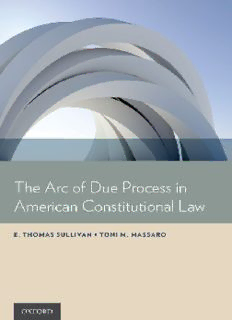
The arc of due process in American constitutional law PDF
Preview The arc of due process in American constitutional law
Th e Arc of Due Process in American Constitutional Law This page intentionally left blank Th e Arc of Due Process in American Constitutional Law E. Th omas Sullivan , President, University of Vermont and Toni M. Massaro , Regent’s Professor and Milton O. Riepe Chair in Constitutional Law , University of Arizona 1 1 Oxford University Press is a department of the University of Oxford. It furthers the University’s objective of excellence in research, scholarship, and education by publishing worldwide. Oxford New York Auckland Cape Town Dar es Salaam Hong Kong Karachi Kuala Lumpur Madrid Melbourne Mexico City Nairobi New Delhi Shanghai Taipei Toronto With offi ces in Argentina Austria Brazil Chile Czech Republic France Greece Guatemala Hungary Italy Japan Poland Portugal Singapore South Korea Switzerland Th ailand Turkey Ukraine Vietnam Oxford is a registered trade mark of Oxford University Press in the UK and certain other countries. Published in the United States of America by Oxford University Press 198 Madison Avenue, New York, NY 10016 © Oxford University Press 2013 All rights reserved. No part of this publication may be reproduced, stored in a retrieval system, or transmitted, in any form or by any means, without the prior permission in writing of Oxford University Press, or as expressly permitted by law, by license, or under terms agreed with the appropriate reproduction rights organization. Inquiries concerning reproduction outside the scope of the above should be sent to the Rights Department, Oxford University Press, at the address above. You must not circulate this work in any other form and you must impose this same condition on any acquirer. Library of Congress Cataloging-in-Publication Data Sullivan, E. Th omas. Th e arc of due process in American constitutional law/E. Th omas Sullivan and Toni M. Massaro. pages cm Includes bibliographical references and index. ISBN 978-0-19-999080-1 (hardback : alk. paper) 1. Due process of law—United States. I. Massaro, Toni Marie, 1955—II. Title. KF4765.S85 2013 347.73'5—dc23 2012042268 9 8 7 6 5 4 3 2 1 Printed in the United States of America on acid-free paper Note to Readers Th is publication is designed to provide accurate and authoritative information in regard to the subject matter covered. It is based upon sources believed to be accurate and reliable and is intended to be current as of the time it was written. It is sold with the understanding that the publisher is not engaged in rendering legal, accounting, or other professional services. If legal advice or other expert assistance is required, the services of a competent professional person should be sought. Also, to confi rm that the information has not been aff ected or changed by recent developments, traditional legal research techniques should be used, including checking primary sources where appropriate. (Based on the Declaration of Principles jointly adopted by a Committee of the American Bar Association and a Committee of Publishers and Associations.) You may order this or any other Oxford University Press publication by visiting the Oxford University Press website at www.oup.com To Leslie Black Sullivan (ETS) and Genevieve Leavitt (TMM) This page intentionally left blank {contents} Acknowledgments ix Preface xi 1. English History and Rule of Law Roots of American Due Process 1 2. Th e Primary Divide: Procedural versus Substantive Due Process 38 3. What Process Is Due? 81 4. What Liberties Are Protected? 122 5. Due Process Hybrids 168 6. A Th eory Runs Th rough It 216 Index 239 This page intentionally left blank {acknowledgments} Tom Sullivan would like to acknowledge with appreciation the University of Minnesota, which provided him with a leave for the winter semester 2012 to fi nish this book. He also acknowledges with appreciation the University of Minnesota Law School, including Dean David Wippman and the faculty, especially Professors Robert Stein and Brian Bix, who gave comments on portions of this book. He also would like to recognize and extend a special appreciation to his research assistants Tom Pryor (Class of 2013), Emily Puchalski (Class of 2013), Eric Friske (Class of 2013), Daniel Schiff (Class of 2011), Cicely Miltich (Class of 2011), and Mary Alice Schumacher, his administrative assistant. Also, he would like to express deep appreciation to col- leagues at New York University Law School who hosted him as a Visiting Professor for the winter 2012 semester, including Dean Richard Revesz and Vice Dean Randy Hertz, and Robert Anselmi, his administrative assistant at NYU. Toni Massaro would like to acknowledge with appreciation the University of Arizona James E. Rogers College of Law for research and ongoing intellectual support. Special thanks go to Professor Barbara Atwood, for her characteristi- cally wise comments and warm support; her excellent research assistants Joseph Ezzo (Class of 2012), Emily Peiff er (Class of 2014), Michael Shumway (Class of 2013), Nick Verderame (Class of 2013), and Matt A. Walker (Class of 2013); Ms. Sandy Davis, Ms. Judith Parker, Ms. Barbara Lopez and Ms. Carol Ward for superb administrative and secretarial support; and Ms. Maureen Garmon—world’s best research librarian. Finally, she wishes to acknowledge the enormous intellectual debt she owes to her Arizona faculty colleagues and to her Stanford co-authors and colleagues, Barbara Allen Babcock and Norman Spaulding. All give meaning- ful substance to the professional process—through “thick and thin.” Th is work builds on our prior work, including writings in the following publications: • E. Th omas Sullivan and Richard S. Frase, Proportionality Principles in American Law (2009). • E. Th omas Sullivan and Toni M. Massaro, D ue Process Exceptionalism , 46 The Irish Jurist (2011). • Toni M. Massaro, Constitutional Law as “Normal Science,” 21 Const. Comment . 547 (2004). • Toni M. Massaro, Substantive Due Process, Black Swans, and Innovation , Utah L. Rev. 987 (2011).
Description: